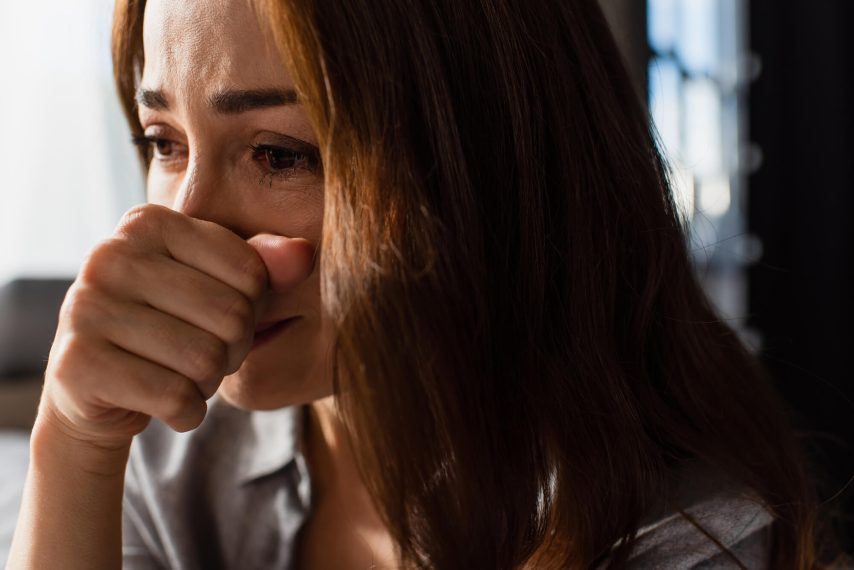So your families and friends were there for you. But here you are many months later still recovering, still feeling numb.
You know it's normal to grieve so you anticipate that it'll take a while and yet time is passing.
Can't stop grieving?
"Receiving comfort for a loss is not the same as resolving that loss."
Most people manage their grief using the love of their families and friends. We know it's normal to grieve after a loss especially sudden losses so we anticipate that it'll take some time.
This normalizing factor plays a big role in why most people don't seek psychotherapy for bereavement.
If you're not moving on with your grief, counseling can be helpful — but not for the reason you'd normally think.
You see the comfort of your family and friends may not be sufficient.
Instead, what you need is to resolve your loss. You need to move through or work through your feelings of loss in order to move on. This means you must allow the feelings to flow through you.
That can be an insurmountable challenge especially if you're feeling numb.
This is how counseling is beneficial where the words of a kind friend often fall short.
And yet there's more . . .
Loss is experienced to the degree to which we have experienced other losses.
Bottom Line: the more loss you have experienced in your life and the earlier it happened, the more difficulty you will experience moving through grief later in life.
Experiencing a loss easily triggers other losses especially those losses that have not yet been fully resolved. The reason that this happens is due to the interconnectivity of the brain and how our experiences are mapped out via neuropathways.
I'm talking about early loss. The loss of connection you may have felt when you were cared for as an infant, toddler or young child. These losses have a much greater impact for the reason that your sense of self is still developing.
The brain is more impressionable during our formative years. This is especially so when the nervous system is growing in the first 3 years of life.
We are learning more at this stage of our life than the next 13 years. So this learning has greater impact.
"I can't feel but I think I should be feeling."
The power of these early experiences make it harder to get at your feelings today. It's as if you start to crack open the door and it blows wide open. Now you're suddenly swamped. You can't stop the flow.
A loss, sudden or otherwise, can be overwhelming to the nervous system. It can increase your physiological arousal so much so that you move outside your Zone of Comfort (otherwise known as the Window of Tolerance).
One way the nervous system responds to an influx of energy is to cap it. That's why you're now feeling numb. (See freezing up and dissociation for more an indepth discussion of feeling numb.)
The brain couples up our experiences and because our experiences form neuropathways it is easy to see that the interconnectivity of the brain makes us tap into other losses.
If you have a hard time seeing how this works, imagine a time when you were really angry at your brother, or your sister, or your friend or your partner.
Many people start to experience anger that was left unresolved:
"And I remember the other time when you…!"
One moment of anger triggers another and suddenly we remember all the other times when we felt that way.)
We all need the comfort of others.
As I may have suggested elsewhere, being around others who are more grounded helps us to regulate also. In other words, we affect each other more than we realize.
And thankfully, science is catching up with what many of us already know in our hearts. That is, we know that it's a comfort to have others around. But some of us don't always know that we know — if you know what I mean. It sometimes takes the progress of science for us to believe what is real.
Maybe this is the time to speak with a counsellor. I know if you've never been it can feel like a big step. I recommend these folks, not just because they help sponsor this site but I like their business model and particularly how they make it affordable to get started. Decide for yourself: click here to learn more: BetterHelp.
How do they sponsor the site? When you click through and decide to go with them, myShrink receives a commission. Click here to learn more about: BetterHelp.
Others have an impact on you
For an interesting article on what neuroscience has found about the effect we have on each other, read a recent essay in the New York Times by the well-known Daniel Goleman. As you may already know, Dr. Goleman wrote Emotional Intelligence, a ground breaking best seller.
Dr. Goleman cites research for instance, that suggests the physical presence of loved ones can lower our blood pressure. You probably already knew how the opposite feelings can effect us . . .
Just imagine the last time that your partner was angry — even if the anger wasn't directed at you. You no doubt felt some of that distress in your own body.
Related Off Site Content
Related Topic
Resilience of your nervous system
How Can I Help You To Say Goodbye?
"Mama whispered softly, Time will ease your pain
Life's about changing, nothing ever stays the same
And she said, How can I help you to say goodbye?
It's OK to hurt, and it's OK to cry
Come, let me hold you and I will try
How can I help you to say goodbye?"
- By Patty Loveless

